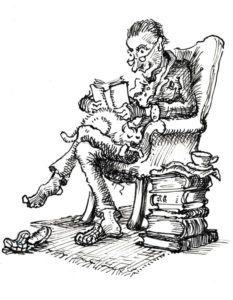Nathanael West’s Disease
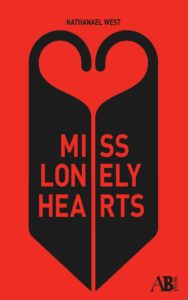
MISS LONELYHEARTS is Nathanael West’s second novel, published in 1933. Many critics consider it to be his best; West’s close friend, F Scott Fitzgerald, considered it to be “quite extraordinary.”
Miss Lonelyhearts is an unnamed male newspaper advice columnist who is derided by colleagues and overwhelmed by responsibilities. He has become depressed, and is lost in a rotation of drink, bar brawls and lust. The book’s ending includes religious redemption, an attempt at a miraculous rapprochement, a gun inside a rolled newspaper, and a flight of stairs…
Although it did not sell well in his lifetime, the influence of West’s Expressionist black satire was far-reaching. West was deeply disappointed by the American Dream, and his novels read still as bleak and unremittingly dark, apolitical, and as dismissal of faith, artistic expression and romantic love. He has become a masthead for subsequent and similar dissent. W. H. Auden in 1962 coined the phrase “West’s Disease,” and wrote that these books were “parables about a Kingdom of Hell whose ruler is not so much a Father of Lies as a Father of Wishes.”
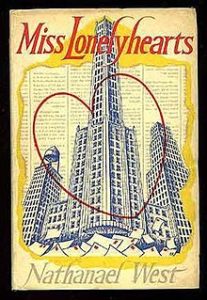 NATHANAEL WEST (1903-1940) was born Nathan Weinstein in Upper West Side in New York City. He was expelled from school and only just passed his degree at Brown University. He had gained admittance to both college and university by deceit, after he had forged his high school transcript and ‘borrowed’ one from a cousin who had the same name for his university entrance. (Malcolm Cowley referred to these misdemeanours as “the ethics of Dada.”) His Jewish background excluded him from much of fraternity life at university. He was supremely inadequate at sport, a trait he mythologized as raconteur and writer, and he flunked his classes spectacularly. When a student he read widely, though he was drawn far more to French surrealism, Dada and the Fin de Siècle British and Irish writers, Oscar Wilde especially, than to the bestselling realism of his time.
NATHANAEL WEST (1903-1940) was born Nathan Weinstein in Upper West Side in New York City. He was expelled from school and only just passed his degree at Brown University. He had gained admittance to both college and university by deceit, after he had forged his high school transcript and ‘borrowed’ one from a cousin who had the same name for his university entrance. (Malcolm Cowley referred to these misdemeanours as “the ethics of Dada.”) His Jewish background excluded him from much of fraternity life at university. He was supremely inadequate at sport, a trait he mythologized as raconteur and writer, and he flunked his classes spectacularly. When a student he read widely, though he was drawn far more to French surrealism, Dada and the Fin de Siècle British and Irish writers, Oscar Wilde especially, than to the bestselling realism of his time.
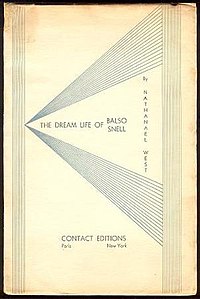 His family’s business failures meant that his financial support, which had afforded him life in Paris for three months in 1926, was withdrawn. From the late 1920s he worked for his father’s building firm, and eventually as night manager of Manhattan’s Hotel Kenmore Hall, then assistant manager of the Sutton Hotel, East 56th Street, which he turned into a writers’ retreat. Dashiell Hammett finished The Maltese Falcon there; Maxwell Bodenheim, Erskine Caldwell, S. J. Perelman (West’s brother-in-law), Edmund Wilson and others were frequent overnight visitors. This job also afforded West time to write: The Dream Life of Balso Snell was published in 1931 and Miss Lonelyhearts, considered his best novel, was published in 1933, though it had been started in early 1930 and finished in late 1932; A Cool Million followed in 1934.
His family’s business failures meant that his financial support, which had afforded him life in Paris for three months in 1926, was withdrawn. From the late 1920s he worked for his father’s building firm, and eventually as night manager of Manhattan’s Hotel Kenmore Hall, then assistant manager of the Sutton Hotel, East 56th Street, which he turned into a writers’ retreat. Dashiell Hammett finished The Maltese Falcon there; Maxwell Bodenheim, Erskine Caldwell, S. J. Perelman (West’s brother-in-law), Edmund Wilson and others were frequent overnight visitors. This job also afforded West time to write: The Dream Life of Balso Snell was published in 1931 and Miss Lonelyhearts, considered his best novel, was published in 1933, though it had been started in early 1930 and finished in late 1932; A Cool Million followed in 1934.
These novels were commercially unsuccessful though. West relocated to Hollywood as a contract scriptwriter for Columbia Pictures. He worked on B movies mostly, with no outstanding success, and completed his last novel, The Day of the Locust, which was published in 1939. Set in Hollywood, it was West’s 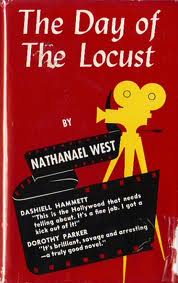 last published piece before his early death. West was in many ways anti-Modernist, with Hollywood and mass culture as his backdrop, and his wish to expose the sick roots of American society and its progress. The book’s title – it’s working title had been The Cheated – almost certainly refers to the plague of locust in Exodus, sent as retribution. He had written to Scott Fitzgerald: “So far the box score stands: Good reviews—fifteen percent, bad reviews—twenty five percent, brutal personal attacks, sixty percent.” He admitted though that: “Sales: practically none.” This disappointed West, who originally had high hopes for the book but reflected that “I seem to have no market whatsoever.” Bennett Cerf, his publisher at Random House, was enthusiastic initially but in fact did little to promote the book. West described the book to Edmund Wilson as a “definite flop.”
last published piece before his early death. West was in many ways anti-Modernist, with Hollywood and mass culture as his backdrop, and his wish to expose the sick roots of American society and its progress. The book’s title – it’s working title had been The Cheated – almost certainly refers to the plague of locust in Exodus, sent as retribution. He had written to Scott Fitzgerald: “So far the box score stands: Good reviews—fifteen percent, bad reviews—twenty five percent, brutal personal attacks, sixty percent.” He admitted though that: “Sales: practically none.” This disappointed West, who originally had high hopes for the book but reflected that “I seem to have no market whatsoever.” Bennett Cerf, his publisher at Random House, was enthusiastic initially but in fact did little to promote the book. West described the book to Edmund Wilson as a “definite flop.”
Nathanael West died in California in December 1940 with his wife in a car accident when he jumped a stop line; by repute he was a bad driver. He was only 37. His great friend F Scott Fitzgerald had died the previous day.
Nathanael West’s literary reputation at the time of his death was negligible, but his worth and consequence has been revalued since the 1950s. When Miss Lonelyhearts was published it received derisive attention from critics. The Los Angeles Times held it to be “tedious trash. …This book is both dull and dirty, and I hope I shall never lay eyes on it again;” The Philadelphia Record likened West to “a kid who delights in pulling off the legs of a fly to watch it squirm.” Reviews for his later books were consistently harsh if not downright unfavourable.
When Miss Lonelyhearts was reissued in 1946, critics were prepared to allude to its sociological depth. The New Yorker, for instance, referred to it as a “bitter, psychologically complex story.” Similarly a 1950 reissue of The Day of the Locust met new appreciation, and the book’s realism was noted before declarations of disgust; one critic announced even that it was a book “destined to endure.”
West’s Complete Works were published in one volume by New Directions in 1957. The publisher’s founder, James Laughlin, had remembered that William Carlos Williams (with whom West had edited the literary magazine Contact in the early 1930s, and who had printed the first five of the chapters that comprise Miss Lonelyhearts) had brought West’s work to his attention. By now the tide of unfavourable reception had been turned completely. The New York Post found West to be “an enormous talent,” that he had a “Swiftian mordancy and a poet’s eye coupled with a real moral passion.”
In 1962 Hayden Carruth was able to write: “Nathanael West, who died almost unknown in 1940, is recognized today as one of the most significant American writers of his time.”
“…an artist can afford to be anything but dull.” – NATHANAEL WEST
“Wildly funny, desperately sad, brutal and kind, furious and patient there was no other like Nathanael West.” – DOROTHY PARKER
NATHANAEL WEST’S BIBLIOGRAPHY
1931: The Dream Life of Balso Snell
1933: Miss Lonelyhearts
1934: A Cool Million
1939: The Day of the Locust




